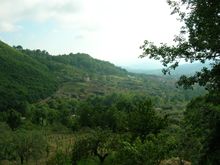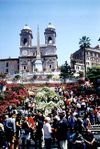Cilento
| Cilento and Vallo di Diano National Park* |
|
|---|---|
| UNESCO World Heritage Site | |
|
|
|
| State Party | |
| Type | Natural |
| Criteria | C (iii) (iv) |
| Reference | n. 842 |
| Region** | Europe and North America |
| Inscription history | |
| Inscription | 1998 (22nd Session) |
| * Name as inscribed on World Heritage List. ** Region as classified by UNESCO. |
|

Cilento is an Italian geographical region of Campania in the central and southern part of the Province of Salerno and an important tourist area of southern Italy.
Contents |
Geography
The coast (on Tyrrhenian Sea) is located between Paestum and the Gulf of Policastro, near the town of Sapri. More of touristic towns by the coast are "frazioni"; as for example Santa Maria di Castellabate, Acciaroli, Velia, Palinuro, Marina di Camerota, Scario and Policastro Bussentino.
The inner boundaries are the Alburni mountains and Vallo di Diano, sometimes considered as part of cilentan geographical region, which has in Sala Consilina its largest center. The most important towns in this area are Vallo della Lucania (in the middle), Sapri and Agropoli: this is the largest town of Cilento and the principal harbour. Most of this area is included in "Cilento and Vallo di Diano National Park".
History
Greek colony
The region is steeped in Greek mythology and legends, as in the names of some towns, which is also visible in the remains of the colonies of Velia (ancient Elea) and Paestum (ancient Poseidonia). Velia was also the seat of "Eleatics", a school of pre-Socratic philosophers as Parmenides, Zeno of Elea and Melissus of Samos).
Sixth province of Campania
In the 1990s it was proposed to make Cilento a new province of Campania [1]. This proposal has never come near to implementation; in particular there was the difficulty of choosing an administrative centre. The four candidates were Vallo della Lucania (in the most central position), Agropoli (the largest town, situated in the north), Sala Consilina (the most populous town of Vallo di Diano) and Sapri (in the centre of southern Cilento, with the most important railway station). Another more recent proposal was to move Cilento from Campania to Basilicata, as a third province[2] together with the existing provinces of Potenza and Matera.
National Park
In a great part of the territory of Cilento and Vallo di Diano there was instituted, on 1991, a national park, to protect the territory from building speculation and mass tourism. In 1998 the park becomes a World Heritage Site of UNESCO.
Coast
The Cilentan Coast, or Costiera Cilentana in Italian, is a stretch of coastline situated in the gulfs of Salerno and Policastro, extending in 16 municipalities; from Capaccio-Paestum in the north-west to Sapri in the south-east.
Language
Cilento was part of ancient Lucania, and its language is influenced by Lucanian. In the north of Cilento the dialect is more influenced by Neapolitan, but in the south it has many similarities with Sicilian.
Photogallery
|
Agropoli |
 Velia |
 Licosa island in the Comune of Castellabate |
Paestum |
 Paestum |
 Romagnano al Monte |
 S.Maria di Castellabate |
 Cape Palinuro |
See also
|
|
References
- ↑ (Italian) Information about the new province
- ↑ (Italian) Article on Corriere della Sera
Bibliography
- Maurizio Tortora: Cilientu mia. Edizione del Delfino, 1977, Naples
- Giuseppe Vallone: Dizionarietto etimologico del basso Cilento. Editore UPC, 2004
- Pietro Rossi: Ieri e oggi 1955-2005. Poesie in cilentano. Grafiche Erredue, 2005
- Barbara Schäfer: Limoncello mit Meerblick. Unterwegs an der Amalfiküste und im Cilento. Picus, 2007, ISBN 978-3-85452-924-8
- Peter Amann: Cilento aktiv mit Costa di Maratea - Aktivurlaub im ursprünglichen Süditalien. Mankau, 2007, ISBN 3938396083
- Peter Amann: Golf von Neapel, Kampanien, Cilento. Reise Know-How, 2006, ISBN 3831715262
- Barbara Poggi: La Cucina Cilentana - Köstlichkeiten aus der Cilento-Küche. Mankau, 2006, ISBN 3938396024
- Luciano Pignataro: Le ricette del Cilento. Ed. Ippogrifo, 2007, ISBN 978-88-8898643-2
External links
- That's Amore Cilento Country House- Beautifull Apartments on the sea (Italian) (English)
- Historical and other information regarding National Park of Cilento and Vallo di Diano (English)
- Holidays in Cilento National Park (English)
- Tourism in the National park of Cilento (Italian)
- Cilento and Vallo di Diano National Park (Italian) (English)
- Cilento NEWS(Italian)
- Tourism and holidays in Cilento (Italian)
- Hotel Reservation in Cilento (English)
- Holidays in Cilento (Italian)
|
|||||||
|
|||||||||||
|
|||||||||||||||||||||||||||||||
_-_The_Last_Supper_(1495-1498).jpg)



